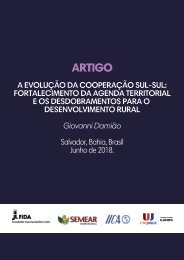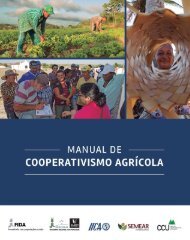The Evolution of South-South Cooperation
Since the Bandung Conference in 1955, the countries of the South have organized themselves in a structured way to achieve better levels of development. This article aims to present the evolution and recent trends of South-South Cooperation, showing how the historical dynamics have led the United Nations and its agencies to adopt a territorial approach, with a strong appeal to mobilize local actors. Allied to this, the increase of the independence of the actors that, with autonomy, manage to dialogue and conduct initiatives of cooperation outside the formal sphere of the central government. This article also aims to present rural development, agriculture and food security as essential factors for the development that since 1978, with BAPA (Buenos Aires Plan of Action), is one of the main thematic lines presented when it comes to the development of the southern agenda. Alongside this, the challenges presented by the prioritization of market dynamics in the face of social development, and how some of the multilateral agencies have worked to promote the facilitation of South-South cooperation and empowerment of minorities, in the achievement of governance as a strategy for endogenous and localized development
Since the Bandung Conference in 1955, the countries of the South have organized themselves in a structured way to achieve better levels of development. This article aims to present the evolution and recent trends of South-South Cooperation, showing how the historical dynamics have led the United Nations and its agencies to adopt a territorial approach, with a strong appeal to mobilize local actors.
Allied to this, the increase of the independence of the actors that, with autonomy, manage to dialogue and conduct initiatives of cooperation outside the formal sphere of the central government. This article also aims to present rural development, agriculture and food security as essential factors for the development that since 1978, with BAPA (Buenos Aires Plan of Action), is one of the main thematic lines presented when it comes to the development of the southern agenda. Alongside this, the challenges presented by the prioritization of market dynamics in the face of social development, and how some of the multilateral agencies have worked to promote the facilitation of South-South cooperation and empowerment of minorities, in the achievement of governance as a strategy for endogenous and localized development
You also want an ePaper? Increase the reach of your titles
YUMPU automatically turns print PDFs into web optimized ePapers that Google loves.
However, outside the formal and governmental spheres, the cases <strong>of</strong> success regarding<br />
the promotion <strong>of</strong> agricultural development, food security and strengthening the economy <strong>of</strong> local<br />
communities become good examples <strong>of</strong> practices that can be replicated for countries <strong>of</strong> the<br />
<strong>South</strong>. One <strong>of</strong> the benefits brought by the territorial autonomy approach consists in the capacity <strong>of</strong><br />
subnational and local units to advance in skill-sharing and capacity-building agendas without<br />
including the federal government into the decision-making process. In this context, multilateral<br />
agencies can play an important role in channeling good practices and dialogue among the local<br />
units <strong>of</strong> the different States so as to replicate the gains in countries with similar contexts. <strong>The</strong><br />
Inter-American Institute for <strong>Cooperation</strong> on Agriculture (IICA) is an example <strong>of</strong> international<br />
organization that progressively established dialogue with the <strong>South</strong>-<strong>South</strong> and triangular<br />
cooperation. Initially it was a technical organization, with a view to promoting better management<br />
<strong>of</strong> agricultural production with emphasis on the process <strong>of</strong> export and food trade, but which in the<br />
21st century arises as a platform for execution and implementation <strong>of</strong> programs <strong>of</strong> multilateral<br />
promotion agencies.<br />
commitment <strong>of</strong> the Brazilian government to support Brazilian private sector<br />
investment in Mozambique (AMANOR; CHICAVA, p. 20, 2016). 11<br />
Through the partnership between the IFAD and the IICA is created the SEMEAR<br />
Internacional program, which, in the context <strong>of</strong> agricultural development and food security, is<br />
concerned, as a priority, with identifying and facilitating the exchange <strong>of</strong> experiences and good<br />
practices in projects supported by the IFAD in Brazil, based on the context <strong>of</strong> life <strong>of</strong> the northeastern<br />
semi-arid region. It is expected to generate knowledge sharing among the regions <strong>of</strong> Africa and<br />
<strong>South</strong> America that experience problems similar to those observed in the semi-arid region, which is<br />
also present in other countries. Thus, in conjunction with the granting <strong>of</strong> autonomy to the territories,<br />
it is observed a facilitation <strong>of</strong> dialogue between international organizations with a view to the<br />
effective achievement <strong>of</strong> development. As a trend <strong>of</strong> <strong>South</strong>-<strong>South</strong> <strong>Cooperation</strong>, it is observed the<br />
need to establish more dialogue between localities, nationally and internationally, so directly they<br />
11 Brazilian agricultural initiatives in Mozambique, as in Ghana, are structured around social protection, technology<br />
transfer and export <strong>of</strong> Brazilian agribusiness products. <strong>The</strong>y involve both bilateral transfers associated with export <strong>of</strong><br />
Brazilian machinery and trilateral programs with western donors associated with technology transfer, which is <strong>of</strong>ten<br />
articulated within a framework <strong>of</strong> SSC [<strong>South</strong>-<strong>South</strong> <strong>Cooperation</strong>]. In March 2015, Brazil and Mozambique signed a<br />
<strong>Cooperation</strong> and Investment Facilitation Agreement (ACFI) with the aim <strong>of</strong> ‘‘strengthening the internationalization <strong>of</strong><br />
Brazilian companies by giving investors greater security”. This indicates the commitment <strong>of</strong> the Brazilian government<br />
to support Brazilian private sector investment in Mozambique.<br />
21




